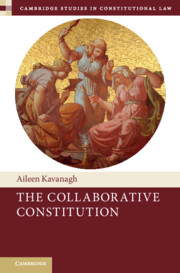Book contents
- The Collaborative Constitution
- Cambridge Studies in Constitutional Law
- The Collaborative Constitution
- Copyright page
- Brief Contents
- Contents
- Acknowledgements
- Abbreviations
- Introduction
- Part I Institutions and Interactions
- Part II Rights in Politics
- Part III Judge as Partner
- Part IV Responsive Legislatures
- 11 Underuse of the Override
- 12 Declarations, Obligations, Collaborations
- Conclusion
- Bibliography
- Index
- Books in the series
12 - Declarations, Obligations, Collaborations
from Part IV - Responsive Legislatures
Published online by Cambridge University Press: 12 October 2023
- The Collaborative Constitution
- Cambridge Studies in Constitutional Law
- The Collaborative Constitution
- Copyright page
- Brief Contents
- Contents
- Acknowledgements
- Abbreviations
- Introduction
- Part I Institutions and Interactions
- Part II Rights in Politics
- Part III Judge as Partner
- Part IV Responsive Legislatures
- 11 Underuse of the Override
- 12 Declarations, Obligations, Collaborations
- Conclusion
- Bibliography
- Index
- Books in the series
Summary
One key question which arises under the Human Rights Act 1998 is whether there is a constitutional convention of political compliance with declarations of incompatibility. This chapter provides a comprehensive empirical analysis of all the political responses to declarations of incompatibility in the first two decades of the HRA. It concludes that there is significant evidence of a constitutional convention in statu nascendi. Though the convention does not preclude the government and legislature from rejecting a declaration of incompatibility in exceptional and rare circumstances, there is a conventional and normative expectation amongst the key political actors that they are under an obligation to comply with those declarations in the normal run of affairs.
Keywords
- Type
- Chapter
- Information
- The Collaborative Constitution , pp. 363 - 402Publisher: Cambridge University PressPrint publication year: 2023

